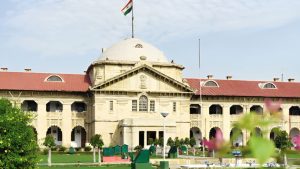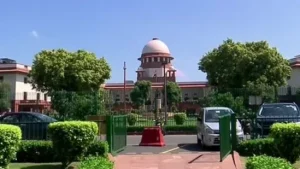New Delhi – The Supreme Court of India has put a stay on a recent ruling by the Allahabad High Court, a decision that had sparked intense debate over its potential consequences for local governance. The order of Supreme Court Stays Allahabad High Court Ruling brings temporary relief to affected parties and opens the door for further deliberations on the legal and constitutional aspects of the case.
Background of the Allahabad High Court Ruling
The Allahabad High Court had recently issued a ruling that significantly impacted local governance in Uttar Pradesh. The decision had major ramifications for municipal bodies, governance structures, and administrative procedures, triggering reactions from various political, legal, and civic stakeholders. The ruling was seen by some as a step toward increased accountability, while others viewed it as an overreach that could destabilize existing governance structures.

The ruling primarily focused on the governance and functioning of municipal corporations and local government institutions. It had mandated specific changes in administrative protocols that were perceived to interfere with the autonomy of these bodies. Several municipal authorities had raised concerns that the directive would disrupt their routine operations and impact service delivery to citizens.
The Supreme Court’s Intervention
Following multiple petitions and appeals from affected parties, the Supreme Court decided to intervene, and Supreme Court Stays Allahabad High Court Ruling. The apex court’s decision prevents immediate enforcement of the ruling and allows for a more in-depth examination of its legal basis and consequences.


The order of Supreme Court Stays Allahabad High Court Ruling was issued after a detailed hearing on the matter, where legal representatives from different stakeholders presented their arguments. The court acknowledged the need for maintaining a balance between judicial oversight and executive autonomy. The order of Supreme Court Stays Allahabad High Court Ruling emphasized that while judicial intervention is essential to uphold constitutional values, excessive interference in governance matters could disrupt administrative efficiency.
Implications of the Stay Order
The Supreme Court Stays Allahabad High Court Ruling holds significant importance for local governance in Uttar Pradesh and beyond. Key implications include:
- Temporary Relief for Local Bodies: The ruling had placed certain administrative burdens on municipal bodies, which are now temporarily lifted due to the Supreme Court’s intervention.
- Legal Precedent: The case sets a precedent for future legal interpretations of governance-related rulings, influencing judicial decisions across India.
- Political Reactions: Various political leaders and governance experts have voiced their opinions on the matter, with some advocating for a review of judicial intervention in governance matters.
- Operational Stability: Municipal bodies can now continue their functions without immediate alterations to their administrative framework.
- Citizens’ Services Unaffected: The services provided by local governing bodies remain unaffected, ensuring that the daily needs of citizens are met without disruption.
Constitutional and Legal Aspects
The Supreme Court Stays Allahabad High Court Ruling raises critical legal and constitutional questions. The case highlights the judiciary’s role in governance and the balance of power between the judiciary, executive, and local self-governing bodies. Legal experts argue that the case could lead to a broader interpretation of constitutional provisions concerning local governance.
One of the primary concerns debated in court was the interpretation of Articles related to local self-government in the Indian Constitution. The judiciary’s authority to intervene in executive matters has always been a subject of legal discussion. Some constitutional experts believe that while the judiciary must ensure lawful governance, executive decisions should not be overruled without sufficient grounds.
Responses from Government and Civil Society
The order of Supreme Court Stays Allahabad High Court Ruling has elicited mixed reactions from different stakeholders:
- State Government’s Stand: The Uttar Pradesh government welcomed the Supreme Court’s decision, arguing that the High Court’s ruling could have disrupted administrative functions. It maintained that the governance framework was functioning efficiently and that sudden judicial intervention could create uncertainty.
- Legal Experts’ Opinions: Constitutional law experts have weighed in on the matter, analyzing the implications of the judiciary’s role in governance policies. Some believe that while judicial oversight is necessary, courts should exercise caution before intervening in executive functions.
- Civic Organizations’ Perspective: Some civil society groups support judicial intervention in governance to ensure transparency and accountability, while others fear excessive judicial overreach. Several advocacy groups emphasized the need for a legal framework that allows both judicial oversight and executive independence to coexist.
- Public Opinion: Citizens have expressed varied opinions on the matter. Some believe that judicial intervention ensures better governance, while others feel that such actions can lead to bureaucratic delays and inefficiency.


The Role of the Judiciary in Governance
This order of Supreme Court Stays Allahabad High Court Ruling brings to light the ongoing debate regarding the judiciary’s role in governance. The Indian judiciary has historically played a vital role in upholding constitutional rights and ensuring the government functions within its legal framework. However, questions arise when judicial decisions influence administrative operations directly.
Legal scholars argue that while courts have the authority to review governance policies, excessive interference can lead to complexities. For instance, if every policy decision is subject to judicial review, it may slow down governance and create a scenario where the judiciary indirectly governs executive functions.
Similar Precedents in Indian Judicial History
This is not the first time the Supreme Court has stayed a High Court ruling on governance matters. There have been multiple instances in the past where higher courts have intervened in administrative and governance-related decisions.
For example:
- In a past ruling, the Supreme Court stayed a High Court order related to municipal elections, emphasizing the importance of following proper legal procedures.
- A similar case arose when the Supreme Court intervened in matters concerning the allocation of local government funds, ensuring compliance with constitutional provisions.
These examples highlight the crucial role of the judiciary in maintaining legal order while also emphasizing the need for courts to exercise restraint in governance matters.
Also Read: Delhi High Court Notice to Parvesh Verma 2025: Critical Analysis of The Petition
The Way Forward
The Supreme Court Stays Allahabad High Court Ruling is not a final decision on the matter but rather a temporary measure that allows for further deliberation. The court is expected to conduct detailed hearings before issuing a final verdict. The outcome of this case where Supreme Court Stays Allahabad High Court Ruling, will have far-reaching consequences on governance policies and judicial oversight in administrative affairs.
Several possibilities exist for the final verdict:
- Reaffirmation of the High Court’s Ruling: If the Supreme Court finds the High Court’s ruling legally sound, it may uphold the decision with certain modifications to ensure smooth governance.
- Complete Overruling of the High Court’s Decision: The Supreme Court may determine that the High Court exceeded its jurisdiction, leading to a complete dismissal of the ruling.
- Introduction of New Guidelines: The court could also take a balanced approach by introducing guidelines that clarify the extent of judicial intervention in governance matters.
The final decision will set a precedent for future cases, impacting how judicial bodies handle governance-related disputes.
Closing Remarks on the Case as Supreme Court Stays Allahabad High Court Ruling
The Supreme Court Stays Allahabad High Court Ruling marks a significant moment in India’s legal and governance landscape. The case underscores the complexities of judicial intervention in administrative matters and sets the stage for an important constitutional debate. The final verdict will be keenly watched as it will influence governance practices and legal interpretations in the future.
The Supreme Court Stays Allahabad High Court Ruling highlights the ongoing conversation about the relationship between the judiciary and executive branches of government. While judicial intervention ensures lawful governance, excessive interference in administrative matters could lead to operational inefficiencies. The Supreme Court’s final decision will be instrumental in shaping the governance framework of India in the coming years.

